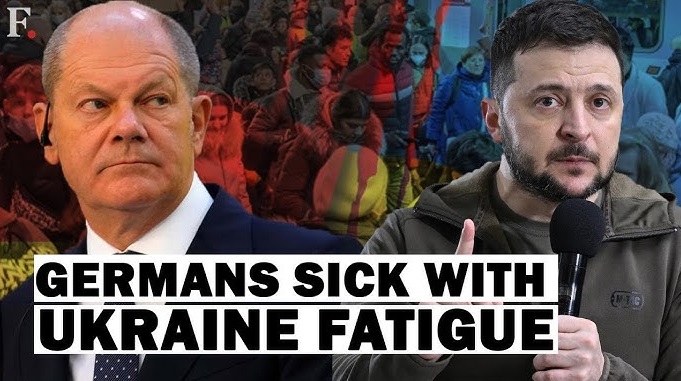
The sands are shifting in European perceptions of the need for peace in Ukraine. In a TV interview, German Chancellor Olaf Scholz urged intensified effort to end the war through negotiations, saying: “I believe now is the moment when we must discuss how we get out of this war situation faster.”
Significantly, Scholz underlined his belief that Russia must be present at future peace discussions, notes ‘UnHerd’.
That a key donor of military aid to Ukraine should call for Russian involvement in peace discussions marks a major shift from the Ukraine Peace Summit held in Switzerland earlier this summer, to which Russia was not invited. It’s a notable — some might say necessary — evolution of the West’s mantra to date: “Nothing about Ukraine without Ukraine.”
Yet the motivations behind this evolution are complex — and leaders such as Scholz may be increasingly swayed by factors other than Ukraine’s best interests. Two days before the German Chancellor’s interview, new data showed a worse-than-expected slump in the country’s industrial production, down by 2.4% month-on-month in July. Analysts now suggest “weakness in German industry” means “the German economy will broadly stagnate in the rest of this year.” These industrial woes are having a knock-on effect throughout the region, with Germany-reliant economies such as Hungary and the Czech Republic also posting disappointing industrial results.
Economists argue that high energy prices can no longer be blamed for the region’s persistent industrial weakness, and that growing competition from China is “a big part of the puzzle”. Beijing’s move to hijack the EU’s green energy revolution is proving especially harmful to Central Europe’s all-important automotive sector, with China positioning itself as a leader in the production of cheap electric vehicles and EV components. The EU’s €8.8 billion trade deficit with China on EVs alone is putting jobs under threat, with major manufacturers such as Volkswagen now shuttering EV production at European plants.
A much-awaited EU competitiveness report drawn up by former Italian prime minister and European Central Bank chief Mario Draghi called for a “new industrial strategy for Europe” to address the “existential challenge” posed by this crisis of competition. Yet with experts predicting thousands more job losses in German industry alone, embattled leaders such as Scholz don’t have time to wait for long-term strategic planning to bear fruit.
Combatting the economic threat posed by China amid a self-imposed Net Zero drive will be the sternest possible test of the EU’s economic might — making the continued funding of a deadlocked struggle in Ukraine a markedly less appealing prospect. It is particularly unfortunate for Kyiv that the brunt of the EU’s industrial tussle with Beijing is being borne by Central European nations which have until now been among Ukraine’s most generous benefactors.
The question facing Scholz and his fellow European leaders is whether to prioritise prosecuting the Brussels’s “cold” trade war with China — with its very real impact on the livelihoods of electorates — over financing Ukraine’s “hot” war on the battlefield against Russia, about which many EU voters are ambivalent at best.
Scholz’s call for peace discussions, coinciding with negative economic data and creeping anxiety over European competitiveness, suggests that EU leaders may ultimately give priority to fighting their own economic battles.
read more in our Telegram-channel https://t.me/The_International_Affairs

 11:27 19.09.2024 •
11:27 19.09.2024 •






















